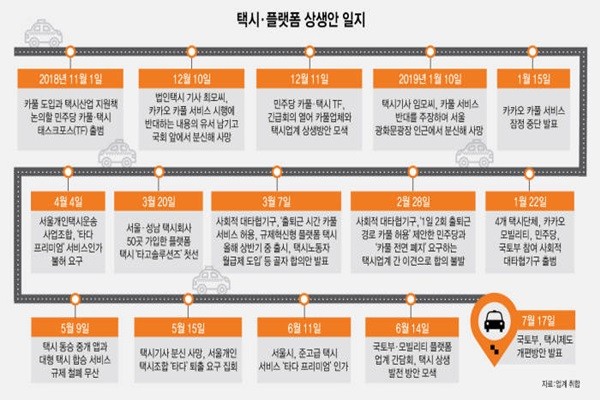Conflict between ‘TADA’ service introduced by VCNC, a ride-sharing startup, and taxi industry came to an end when Ministry of Land, Infrastructure Transport (MOLIT) announced its plan to have VCNC and taxi industry coexist. Fact that MOLIT guaranteed a position for a new transportation company by softening opposition from taxi industry that requested stoppage of ‘TADA’ service is a success.
However, ride-sharing startups including VCNC have taken blows internally. They have to pay about $339 (400,000 KRW) per car to contribute to development of taxi industry.
Rental car businesses are also facing an issue. VCNC currently manages about 1,000 rental cars and it needs to purchase them to satisfy conditions of MOLIT’s plan for coexistence. It will be difficult for VCNC to operate Carnival, which has been the symbol of TADA, as diesel cars are not approved.
Startup companies are also faced with unexpected rivals. As MOTIE is working to expand franchise businesses for taxi chauffer industry, startup companies now have to compete with franchise businesses to survive. Franchise businesses combine current taxi business and taxi platform business and WAYGO and Macaron are prime examples. Because large taxi platform businesses such as Kakao and Uber are expected to start franchise businesses, startup companies now have to compete against them in order to survive.
Although startup companies are able to dust off any controversy surrounding illegality after doing tug-of-war with taxi industry for long time, franchise businesses are the ones that actually benefited from all of this.
◊Franchise business market starts to gather more attraction
There is now a green light for taxi chauffeur franchise businesses. KST Mobility that manages Macaron Taxi and Tago Solutions that has partnered up with Kakao Mobility are gradually expanding their businesses. WAYGO Blue service provided by Tago Solutions can be brought up by Kakao T app.
Regulations have been eased drastically to the level similar to that of transportation markets where there are many startup companies. One can select different types of cars from sedan to luxury vehicle. Owners of cars can decorate their cars in many creative ways. Also, franchise businesses are given power to set up their own fee systems. Entry barriers have been lowered as well as franchise businesses now have to have at least 1,000 taxis when it was 4,000 taxis previously.
This market has changed as even larger taxi platforms such as Kakao and Uber are even considering entering this market. Considering influence of their platforms, they are at an advantageous position to secure corporate taxis as their allies. Uber started making necessary preparations to enter this market and it is currently providing limited services such as ‘Uber Black’, ‘Uber International’, and ‘Uber Taxi’. It has shown interests into taxi business for a while.
“There is a high chance that we will try to grab an opportunity once platform taxi market opens up.” said a representative for Uber.
South Korean Government is also going to focus on expanding franchise business as it sees franchise business as a model that will contribute to growth of taxi market. It made such decision after looking at WAYGO that introduced a systematic taxi driver management program and Macaron service. It needs help from franchise businesses with control in order to respond quickly to state of markets that is changing very rapidly.

◊Startup companies left with having to reexamine their plans
After MOLIT announced its plan, startup industry is in a state of shock. VCNC is the one that has taken the biggest blow. It is currently operating about 1,000 rental cars and it was planning to double the number of rental cars by end of this year. However, it has to now reexamine its plan.
Market conditions have also become difficult as startup companies are now faced with unexpected rivals as regulations on franchise business have been lifted at the same time. They now have to compete with popular taxi brands. Although they have secured their positions as transportation businesses, cost of opportunity is huge. They have to pay out of their pockets to contribute to development of taxi industry. Unlike franchise businesses that will not have limits on how many taxis they can manage, startup companies can only manage reduced number of taxis that is not expected to be over 1,000.
Startup companies are the ones that caused innovation within taxi market. VCNC, Papa, ChaChaVan, and BUXI are the ones that had gone head on with taxi industry and forced MOLIT to come up with its plan. However, only franchise businesses that were step away from the center of dispute between startup companies and taxi industry are the ones that have actually benefited. Startup companies feel victimized by South Korean Government. Although it seems that startup companies and taxi industry has comprised, transportation business has become more difficult for startup companies.
From consumers’ stance, there is a high chance that they will go with taxis based on economic reasoning. Some say that large taxi platforms will flood the market with their products to grab the leadership.
“If Kakao and Uber come up with platforms comprised of thousands of taxis, there will be no more opportunities for startup companies.” said a representative for the industry. “South Korean Government needs to postpone its measure of easing regulations on franchise businesses until startup companies become more competitive.”
“It is meaningful from the fact that we have resolved any uncertainty for startup companies’ businesses.” said a representative for South Korean Government. “It will be difficult for both franchise businesses and transportation businesses to push for large-scale businesses early on.”
Staff Reporter Choi, Jonghee | choijh@etnews.com